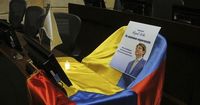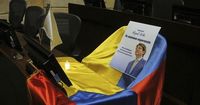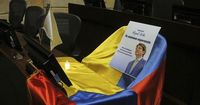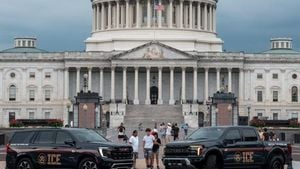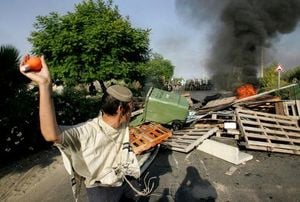Colombia is holding its breath once more as Senator Miguel Uribe Turbay, a prominent conservative politician and leading presidential hopeful for the 2026 elections, fights for his life after a devastating turn in his recovery. The senator, who was shot in a shocking attack during a campaign rally in Bogotá on June 7, 2025, has fallen back into critical condition following a sudden and severe hemorrhage in his nervous system, according to multiple reports from AP, France 24, and Devdiscourse.
The attack, which took place in a bustling city park as Uribe Turbay addressed supporters, sent shockwaves throughout Colombia and the international community. The senator, aged 39, was shot three times—twice in the head and once in the knee—by a gunman authorities later identified as a 15-year-old hired shooter. The incident was not only a personal tragedy for Uribe Turbay and his family but also a grim reminder of Colombia’s turbulent history of political violence, as noted by France 24.
Since that fateful June evening, Uribe Turbay has remained in the intensive care unit at Bogotá’s Fundación Santa Fe clinic. He has undergone multiple surgeries, including urgent neurosurgical procedures immediately after the attack. For a time, glimmers of hope emerged as his condition showed slight improvements and his family expressed cautious optimism. However, on August 9, 2025, the clinic announced that Uribe Turbay had suffered a new hemorrhage in his central nervous system, plunging him once again into critical condition. Doctors responded swiftly, performing further urgent neurosurgery and placing him under deep sedation to aid his recovery.
In a statement released by the Fundación Santa Fe, hospital officials described the senator’s status as grave, emphasizing the complexity of his injuries and the ongoing risks to his life. "His condition is critical," the hospital said, echoing the seriousness of the situation. The senator’s wife, María Claudia Tarazona, has been a pillar of strength throughout the ordeal, sharing her anguish and hope with the public. In an emotional message posted to Instagram, she wrote, "My sweet love, I miss you so much that it tears my soul apart. Come back to me, God willing." Her words have resonated with many Colombians who see Uribe Turbay’s struggle as emblematic of the country’s own battle for peace and stability.
The investigation into the attack has moved swiftly but remains fraught with challenges. Authorities have prosecuted six individuals in connection with the shooting, including Cristian Camilo González Ardilla, known as "El Costeño," who is believed to have been the planner and organizer behind the plot. According to AP and Devdiscourse, González Ardilla’s arrest is seen as a key breakthrough, potentially leading investigators to the masterminds who orchestrated the attack. Yet, the path to justice is far from clear. A minor who was collaborating with the investigation managed to escape from a detention center, highlighting the difficulties faced by law enforcement in a country where criminal networks often operate with impunity.
Perhaps most alarming are the suspicions that the attack was not an isolated act of violence but rather part of a broader campaign by dissident factions of the defunct FARC guerrilla group. As reported by France 24, authorities believe these dissidents may have hired the teenage shooter, reviving fears of a resurgence in political and paramilitary violence that once plagued Colombia. The government, led by President Gustavo Petro, had initiated peace talks with these dissident groups in Venezuela in mid-2024. However, the talks stalled and were eventually suspended, leaving a vacuum that some fear could be exploited by those seeking to destabilize the country ahead of the next presidential election.
Uribe Turbay’s prominence as the favored candidate of the right for the 2026 presidential race has only intensified the scrutiny surrounding the case. His campaign, built on promises of security and economic reform, resonated with many Colombians weary of ongoing violence and political uncertainty. The attack on his life has not only endangered his personal future but has also cast a long shadow over Colombia’s democratic process. The incident has reignited memories of the nation’s darkest years, when political assassinations and cartel violence threatened to tear the country apart.
As the investigation continues, authorities are under immense pressure to bring all those responsible to justice. The arrest of González Ardilla, or "El Costeño," is a significant step, but the identities and motives of those who ordered the attack remain shrouded in mystery. Law enforcement officials have stated that they are pursuing every lead, determined to ensure that the masterminds are held accountable. The escape of a key minor witness, however, has complicated matters and raised concerns about the safety and reliability of those involved in the legal process.
The broader political implications of the attack are hard to ignore. Colombia’s fragile peace, painstakingly constructed over the past decade, now appears more vulnerable than ever. The suspension of peace talks with FARC dissidents has left many wondering whether the cycle of violence can truly be broken. For supporters of Uribe Turbay, the shooting is a call to action—a stark reminder that the fight for a safer, more just Colombia is far from over. For others, it is a sobering indication of the challenges that lie ahead as the country prepares for a pivotal election.
Meanwhile, the nation waits anxiously for updates on Uribe Turbay’s condition. The senator’s family, friends, and supporters continue to hope for a miracle, even as doctors caution that his prognosis remains uncertain. The Fundación Santa Fe clinic has pledged to provide the best possible care, but the road to recovery, if possible, will be long and arduous. The emotional toll on his loved ones is palpable, with María Claudia Tarazona’s heartfelt messages serving as a poignant reminder of the human cost behind the headlines.
In the wake of the attack, political leaders from across the spectrum have condemned the violence and called for unity. President Petro’s government, despite its differences with Uribe Turbay’s conservative platform, has expressed solidarity and reiterated its commitment to protecting all political candidates. Civil society groups and international observers are watching closely, aware that the outcome of this case could set a precedent for Colombia’s future stability.
For now, Miguel Uribe Turbay’s fate hangs in the balance—a symbol of both Colombia’s enduring struggles and its hopes for a more peaceful tomorrow. As the country grapples with the fallout from this brazen act, one thing is clear: the fight for justice and democracy in Colombia is far from finished.
